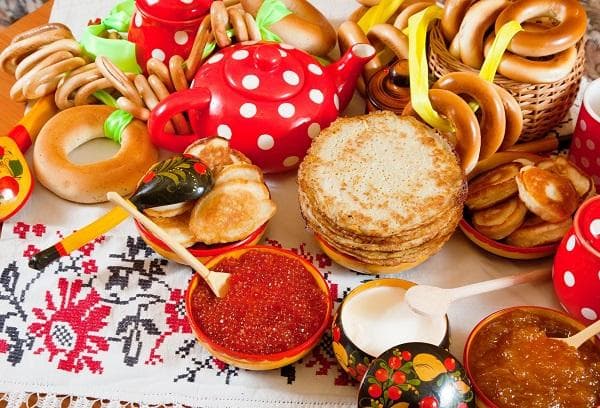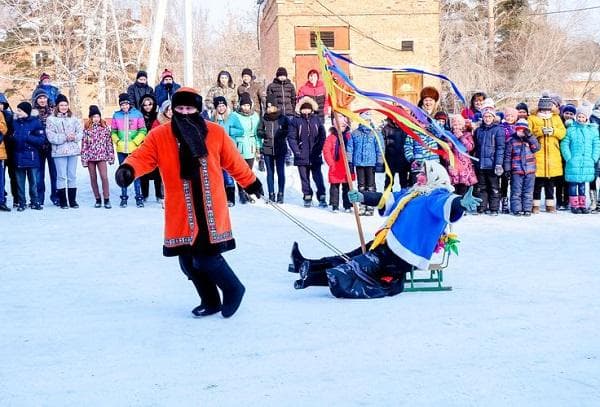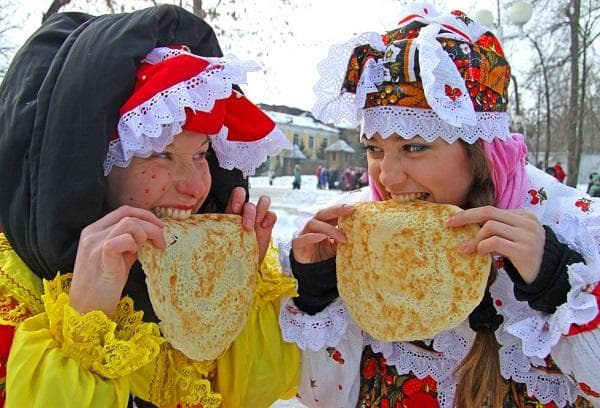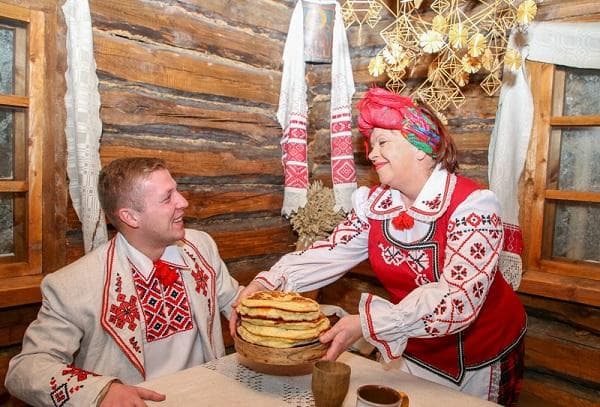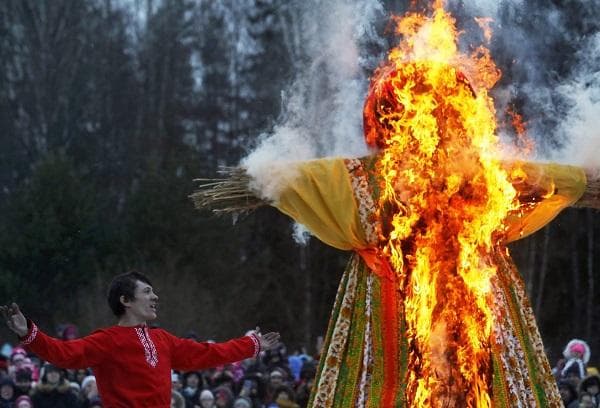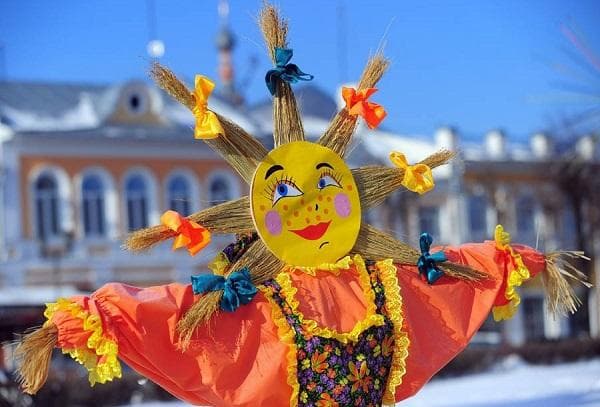To make Maslenitsa a success, let’s remember the traditions of Maslenitsa week by day
Content:
Maslenitsa is one of the most beloved holidays of the Russian people. The entire Maslenitsa week is scheduled by day. On Monday, fathers-in-law go to visit their mother-in-law and father-in-law. On Tuesday, young guys come to visit girls to evaluate their thriftiness. The holiday is permeated with ancient traditions and rituals. The main one is the tradition of cooking and eating delicious, buttery pancakes.
Interesting to know about Maslenitsa: 5 facts for children and adults
The holiday is called Maslenitsa for a reason. According to traditions, on all Maslenitsa days you need to eat a lot of butter, dairy products, eggs, and cottage cheese. A special dish is hearty butter pancakes.
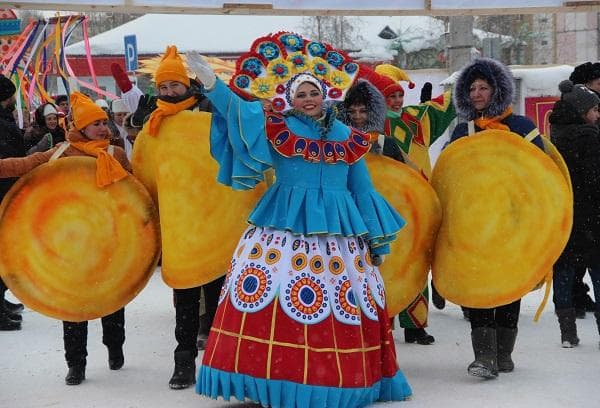
According to Slavic mythology, the pancake represents the Sun.
Maslenitsa has many customs. Summary for children and adults:
- Maslenitsa is celebrated all week, from Monday morning until Sunday evening. Every year the date of the holiday changes. In 2021, the beginning of Maslenitsa fell on March 8th.
- Maslenitsa is celebrated not only in Russia, but throughout the world. It marks the beginning of Lent.
- The holiday originated in the Stone Age, during pagan times. Then it was called “Komoyeditsa”, and replaced the New Year for the ancestors. The beginning of the year was considered the day of the spring equinox. And Komoeditsa was celebrated for 2 weeks: 1 week before the equinox, and 1 week after.
- Maslenitsa combines the traditions of pagan Komoeditsa and Christian Cheese Week.
- Maslenitsa has its own meaning for different families. For some, it represents the arrival of spring, fun, for others - preparation for fasting. For our ancestors, Maslenitsa week was considered a time to strengthen family ties. Unmarried girls and newly-made couples were especially welcome. Most rituals boiled down to matchmaking. Weddings took place after the end of Lent, on Krasnaya Gorka.
That’s why the names of the days are so colorful and self-explanatory:
- "Meeting";
- "Flirting";
- "Gourmand";
- "Revelry"
- "Mother-in-law's evening";
- “Sister-in-law’s gatherings”;
- "Forgiveness Day"
Video for children:
Monday
Monday begins the week called Maslenitsa. Every day has its own name. The “Meeting” holiday opens.
- On this day, the villagers met at the snowy mountain. Teenagers and children made a scarecrow of Maslenitsa from a bag of straw and bright torn clothes. The girls and young men built ice fortresses, installed swings, and poured slides for skating. Then Maslenitsa was carried through the streets with songs, and at the end it was placed on a pole on a hill. People were riding and having fun.
- The richest villagers began to bake pancakes. The first pancake was supposed to be given to the comas - the bears who are the first to sense the arrival of spring and wake up from winter hibernation. Later, traditions changed, and the first pancakes began to be distributed to the poor, with a request to remember their deceased relatives.
- In families with a newly-made bride and groom, preparations took place from the very morning. The girl went to her parents' house to bake pancakes. In the evening, the in-laws came to visit.
- Orthodox Christians celebrate Narrow Maslenitsa from Monday to Wednesday. They don't eat meat anymore. Pancakes are prepared with butter, eggs, fish, and mushrooms.On the first day, pancakes are usually simple, without filling.
People believed that the louder and more fun you celebrated Maslenitsa, the richer the harvest would be that year.
Tuesday
On the second day of Maslenitsa week, the festivities do not subside. You're supposed to have fun and eat pancakes. The main event on this day among the Slavs was considered “Zigrysh”:
- All day the boys and girls rode on the "troika" and ice slides. Performances with Petrushka and Maslenitsa Grandfather took place in street booths. Mummers were walking around the streets. They entered houses, congratulated the owners, and acted out funny scenes. In return, the owners treated them to delicious pancakes.
- During these actions, the guys tried to stand out in front of the girls, and they “made eyes at them.” If the sympathy was mutual, the girls treated the guys to pancakes.
Wednesday
The richest table is set for Lakomka. Customs:
- On the third day, you literally need to “eat your fill,” “eat as many pancakes as the dog can wag its tail.”
- On Wednesday, a large family gathers, invites all relatives and sets a common table.
- Pancakes are prepared in different ways: wheat, rye, buckwheat, oatmeal, with mushrooms, sour cream, fish, caviar, jam and honey. Sbitni and mead are also placed on the table.
- In families where there is a young couple, the mother-in-law sets the table and tries to feed the son-in-law with all her heart. Wednesday was also called “Mother-in-law’s pancakes.” Based on what kind of pancakes the son-in-law preferred, the mother-in-law could determine his character: salty - a difficult character, sweet - a kind and affectionate guy.
There is a belief: the more pancakes you eat at Lakomka, the more solar power you will absorb (you will be healthy and strong).
Thursday
On Thursday, Orthodox Christians begin Broad Maslenitsa or Broad Thursday. Popularly known as “Rampant”. This name characterizes it perfectly:
- On the fourth Maslenitsa day, men's competitions are held: fist fights, tug-of-war, wall-to-wall combat, and taking an ice fortress. Our ancestors believed that by doing so they were helping the Sun defeat winter. For the same purpose, boys and girls rode clockwise around the village on sleighs.
- As darkness falls, fire pits are lit. Daredevils jump over the fire to cheerful shouts and singing.
Friday
“Mother-in-law's evenings” (“get-togethers”) is the most important day for the young groom. He had to receive his mother-in-law at home. And not just accept, but feed them pancakes and other dishes. The bride helped cook. The groom set the table and prepared an entertainment program. Often the mother-in-law came not alone, but with her friends. The guy needed to respect everyone. In return, the women gave good advice about family life.
If the groom neglected the custom, the mother-in-law considered this a severe insult and could even insist on breaking off the engagement.
Families without young people celebrated Maslenitsa Friday in a quiet family atmosphere.
Saturday
The sixth day of Maslenitsa - “Sister-in-law’s gatherings.” Briefly about its traditions:
- For “Sister-in-law's Gatherings,” brides invited their sisters-in-law - the groom's sisters, and sometimes all his relatives - to their home. This day was considered a kind of viewing party. The groom's relatives assessed the girl's thriftiness and culinary abilities.
- On this day, it is customary to clean up and arrange a rich feast. Pancakes were served with caviar, cottage cheese and sour cream.
- There was also such a ritual: at the end of the evening, the bride and groom stood in a circle of guests. The girl publicly kissed the groom, and then all the guests kissed the young woman with the words: “Thank you Maslenitsa!”
- The Church celebrates the Council of All Reverend Fathers.Orthodox Christians go to church to cleanse their souls and spend this day modestly.
Today, people often stop celebrating Maslenitsa by Saturday. Many people burn the effigy and begin to prepare for Lent.
Sunday
The culmination of Maslenitsa week was “Forgiveness Day” or “Farewell to Maslenitsa”. Traditions of this day:
- In the first half of the day, round dances are held around the Maslenitsa effigy. After a short period of fun, the doll is set on fire. Leftover food and Maslenitsa dolls are thrown into the fire. It is believed that all adversity burns away with them. The burnt effigy symbolizes the past winter.
- Relatives and friends ask each other for forgiveness for the offenses caused. All the warring parties are reconciled.
- The dishes are thoroughly washed from oil and a bath is visited.
- In the evening, the Rite of Forgiveness takes place in the church. At the end of the service, the beginning of Lent is announced.
Interesting. In some villages, instead of a scarecrow, they prepared a living Maslenitsa. A girl, a woman, or just a local drunkard was dressed up in bright clothes, put in a sleigh... And then, amid hooting, they were taken over the hill and dumped in the snow. This was the end of the winter farewell.
Christians believe that on Forgiveness Sunday, any sin will be forgiven if words of repentance are spoken out loud. This is why people say apologies to each other. Not accepting them is considered a great sin.
Questions and answers
What are the most delicious pancakes for Maslenitsa?
According to the results of questionnaires, the most delicious pancakes in the world are pancakes with Nutella, bananas, ham and cheese. And if you look by country, in Scandinavia they prefer sour cream and caviar filling, in the USA - peanut butter and maple syrup, in Europe - whipped cream.
Is it possible to clean and work during Maslenitsa?
It is possible and even necessary.On Maslenitsa you cannot welcome guests in an uncleaned house, become reclusive, walk around sad, get angry and offended. They try to finish household chores and work by Thursday. From Thursday you need to devote more time to spiritual matters. On Sunday it is better to give up hard work. But there are no strict prohibitions in this regard.
It doesn’t matter what faith a person is, age, nationality. Maslenitsa is a holiday for everyone. He is wide, cheerful, wild, mischievous. Thousands of people spend Maslenitsa week having fun, baking pancakes and receiving guests. It's great to celebrate Maslenitsa! But it doesn’t hurt to remember the sayings: “Maslenitsa is not all for the cat, there will be Lent too. Maslenitsa is a mess, I’m saving money.”
